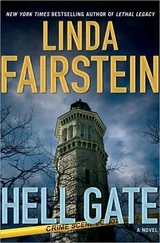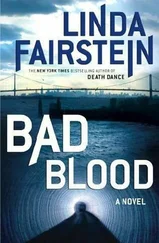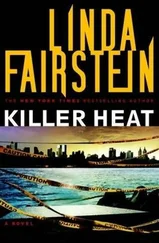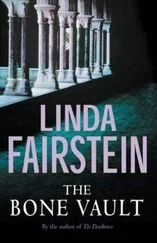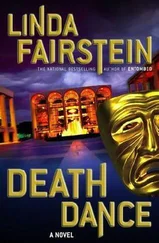"Hey, schmuck. Get real. You're now a permanent part of my files on the case, and we're not even out of the box. Coop and me have a few dozen questions for you we haven't even thought of yet. We haven't talked about Ivan, we haven't asked you about the work Lola was doing, we haven't asked whether you know anything about a load of cash she was hiding. Or about drugs."
Mike gave up on the elevator and tugged on the strap of my bag as he turned to trot down the three flights of stairs to the exit. "Next stop for you is my office. Pick a day. Make it easy for yourself, Counselor. And try telling Vinny the truth. Might be a new thing for you. Or, you can tell him you're in the field. That seems to have worked for you before."
"Let's try and schedule an appointment for the beginning of the week, Bart," I said. "You know how this is going to break, so why don't you tell the district attorney about it before Battaglia gives him a call?"
Frankel was leaning over the banister, calling down to us as quietly as he could. "Do you think I'm going to need a lawyer?"
"Line up a good proctologist first, Mr. Frankel. It's rough in those maximum-security pens."
Mike started the engine and we sat in the lot while it took its time warming up. "Born loser. Knew it the minute I saw him. Know how I could tell? Grown man with a backpack. There's just no excuse for it. Half of those twerps in your office use 'em, too. I get on the elevator at Hogan Place, one of those guys from Appeals gets in after me and turns around. Bam! I get smacked right in the puss with nine pounds of law books. By the time you get out of high school, you should figure out some other way to carry stuff around. What are you thinking about?"
"The position Frankel put himself in. That he'll be out of a job before New Year's. Whatever his involvement is in Lola's death, he was terribly indiscreet to be sleeping with her. And we'll have to tell Sinnelesi that he withheld evidence from us. Not to tell us that he had been with Lola after she left Lily's, and that he actually saw her go into her building with a witness who we didn't even know about before this? Irresponsible and unethical."
"There's some reason that Bart wouldn't give up the fact that he went to Lola Dakota's office," Mike said. "Before we have him back over to interview, let's be sure and examine the inventory of stuff that was there, and get the photos Hal Sherman took at the college. It's even creepier to think that he might have gone there after he found out she was dead.
"Want to swing by the county jail and see if Ivan has anything to tell us? Talk to him about his student snitch, Julian Gariano? See what kind of mood he's in?"
"I'd love to, but his lawyer called on Tuesday while I was up at your office. Said Anne Reininger gave him my name and number. Left me a message telling me who he was and how to get in touch with him. And that under no circumstances was anyone to attempt to speak with his client out of his presence. Does Ivan still bother you, too?"
"Sure does. It's too neat to assume he didn't have something to do with Lola's murder, when he had already gone to such lengths to get rid of his wife. Suppose he figured out or got tipped off that the hit men were part of a government sting operation? It's too late to remove his voice from the tapes and get out of trouble completely. But say he sets up some kind of defense that proves he- what do you call it in legalese?-that he had withdrawn from the plan and he just let these mopes go ahead with it to show what grandstanders they were.
"Meantime, he makes a backup plan to kill Lola. Paying someone in the city to let him know when she's returned to Manhattan. Lola gets knocked off… splat, all over the bottom of the elevator. So even if you don't believe it's an accident, Ivan the Terrible's got a rock-solid alibi for the rest of last Thursday, sitting behind bars, waiting to be arraigned in a Jersey courtroom. And Fat Vinny looks like the incompetent that he is."
People like to think of domestic violence as an issue of the underclass, as something that occurs in minority communities, among the poor and uneducated, as something personal that is not "our problem." Both Mike and I, just like every cop and prosecutor in this country, have investigated and charged doctors, lawyers, judges, businessmen, and clergy with beating, raping, abusing, and murdering their spouses. I was not about to ignore Ivan Kralovic, who had already proved that he was at best abusive, and at worst a potential killer.
"Am I dropping you at your office?"
"Let me check my messages. It was slated to be a slow day. There's no point going there if I don't have to." I used my cell phone to dial into my voice mail. The mechanical voice told me that I had four new messages. I played them back and the first two were from assistants in the unit, telling me about the new cases that had come in over the holiday. The third call was from Sylvia Foote.
"Your pal Sylvia called an hour ago," I told Mike. "About Professor Lockhart, from the history department-"
"The guy who was, shall we say, 'tutoring' the law student we interviewed?"
"Yes. He's returning to town tomorrow afternoon. She left his number. He's agreed to speak to us over the weekend anytime we like. Sylvia says Lockhart is willing to cooperate. Was very fond of Lola. That's the gist of it. She's still looking for Grenier and Lavery." I hit the prompt to save the message so that I could retrieve Lock-hart's number and call him when he reached New York.
Message four. Three twenty-six P.M. I looked at my watch. It had been only ten minutes since that message was recorded. Hey, Alex. It's Teague. I'm up at Special Victims with a new complaining witness. Just reaching out to see whether anyone could interview her before she heads back out to L.A. tonight.
The Special Victims Unit occupied space in the same office building to which Manhattan North Homicide had been transferred more than two years ago. Just above 125th Street, in an unlikely-looking brick structure that faced the elevated subway tracks on the West Side, the two squads were on the same busy corridor. I dialed the number and the civilian aide who answered passed me along to Teague Ryner, another bright young detective who often teamed with Mercer.
"Thanks for calling back so quickly. I was hoping you'd make a decision on this one before she hops on a plane. I don't want to make an arrest unless you think we've got something. Want me to give you the facts?"
"Sure."
"Girl's name is Corinne. Twenty-eight years old. Lives in Santa Monica, says she works in the music business. It all started after she had a few Brain Tumors-"
"Brain tumors? How awful. Is she-"
Teague laughed. "Not that kind. It's a drink. A pretty lethal one."
"What's in it?"
I had seen women's vulnerability increase dramatically after downing multiple Tequila Sunrises, Long Island Iced Teas, Sex on the Beach, and other creations that bartenders invented with every new season. They woke up in strangers' apartments, on the backseats of taxicabs, beneath trees in Riverside Park, and on sidewalks in midtown. "It's my right," they would often tell me, "to drink whatever I want, and as much of it as I want." Detectives, prosecutors, advocates, and jurors were supposed to deal with the aftermath. This was my first Brain Tumor.
"About six different liqueurs mixed together," Teague told me. "She can't remember how many of them she drank. In fact, that's the trouble. She can't remember much of anything."
"Did she drink them voluntarily? I mean, she's not claiming someone drugged her, is she?" Two different kinds of problems, under the law.
"Voluntarily? She was chugging them like they were root beer."
"Tell you what. I'm with Chapman, on our way back from an interview in New Jersey. Since he's got to go up to the squad, I'll just come with him to your office and we'll figure it out together." No point spoiling the end of another colleague's day, as long as I was working.
Читать дальше

